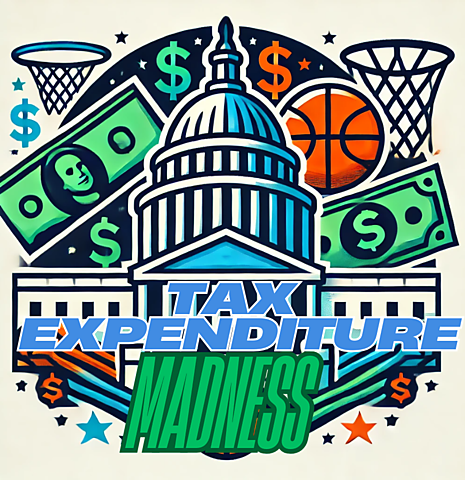Welcome to Tax Expenditure Madness!
Republicans are hard at work piecing together their tax package to extend and expand the Tax Cuts and Jobs Act of 2017, which expires at the end of this year. They are also looking for ways to raise revenue by cutting tax expenditures. Tax Expenditure Madness is here to help Congress identify the worst features of the tax code.
Over the next two weeks, you’ll decide the worst tax expenditure in a series of X polls. Vote for your least favorite here!
The goal of the 2025 tax extensions should be to keep tax rates as low as possible and meet calls for additional pro-growth tax cuts, such as a lower corporate tax rate and permanent investment expensing. To do this within the constraints of the budget process and the fiscal realities of $2 trillion annual deficits, Congress needs to cut spending and find tax offsets.
Tax offsets are often “tax expenditures” or the things in the tax code that create loopholes and preferences for myriad private activities, including politically popular energy sources, education, children, health care, research, state governments, and housing. The Treasury Department listed 170 tax expenditures in the most recent tally, and the Joint Committee on Taxation tally is even higher.
Not every tax expenditure is bad or deserves to be repealed. Some tax expenditures move the tax code toward a neutral consumption tax base by decreasing harmful economic distortions of double taxation built into the normal income tax system. Some of these good tax expenditures are immediate deductions for investments and exemptions for investment income, like 401(k) retirement accounts. Other tax expenditures—and the focus of Tax Expenditure Madness—create true special interest carve-outs and loopholes that grant privileges to some at the expense of others.
Cato’s Chris Edwards describes this distinction in detail in his Cato report, “Tax Expenditures and Tax Reform,” and I have proposed reforming the official definition of tax expenditure to make this distinction clearer to policymakers.
In the spirit of March Madness, I’ve chosen 32 of the most expensive, economically distortionary, and targeted tax expenditures that are genuine loopholes for a bracket contest for the worst tax expenditures in the tax code.
If it were up to me, I’d eliminate all 32 categories of credits, deductions, and exemptions. Removing these provisions and about a dozen others is the foundation of the Cato Tax Plan. It eliminates about $14 trillion worth of tax expenditures over a decade, paired with massively pro-growth tax cuts that reduce income, investment, and business taxes to near 100-year lows.
This exercise illustrates the trade-off between the tax base and tax rates. The more holes Congress puts in the tax base—in the form of special deductions, credits, and exemptions—the higher tax rates must be to raise the same revenue. As tax rates increase, the economic cost of the tax rises exponentially.
I’ve intentionally included many politically popular features of the tax code. For example, even if you believe the federal government should provide subsidies for children, or low-income housing, or electric vehicles, is the tax code the best place for those subsidies? In most cases, tax preferences are effectively uncapped mandatory spending programs without regular congressional oversight. Spending on social and economic policy could be better targeted and fiscally accountable if it were annually appropriated.
The contest will be run on my X profile (@adamnmichel). Voting for the first four rounds (posted over the next four weekdays) will be open through the end of the day on Tuesday, March 25. You can find short explanations on my Substack, Liberty Taxed, here for additional details on each provision.
The goal is to crown the worst tax expenditure. Judge them however you’d like: worst economic distortion, highest cost, narrowest constituency, or most effective lobbyists.

